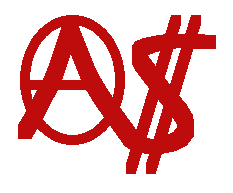Dec 10, 2019
- Bastiat’s Law - There are two distinct types of human interactions: voluntary and non-voluntary.
- The NAp - Voluntary interaction is generally preferred to non-voluntary interaction.
- APp - Caste or status (e.g. ‘agent of the government’) does not generally override the NAp.
Anarchists believe that I, II, and III imply:
Voluntary Society is generally preferred to a State (compulsory government). Even if there exist exceptions under extraordinary circumstances, a standing (non-temporary) State would be unjustified.
Bastiat’s Law

or

There are two basic ways people can live - by production or plunder. Frederic Bastiat put it this way in The Law (1850):
6. A Fatal Tendency of Mankind
Self-preservation and self-development are common aspirations among all people. And if everyone enjoyed the unrestricted use of his faculties and the free disposition of the fruits of his labor, social progress would be ceaseless, uninterrupted, and unfailing.
But there is also another tendency that is common among people. When they can, they wish to live and prosper at the expense of others. This is no rash accusation. Nor does it come from a gloomy and uncharitable spirit. The annals of history bear witness to the truth of it: the incessant wars, mass migrations, religious persecutions, universal slavery, dishonesty in commerce, and monopolies. This fatal desire has its origin in the very nature of man in that primitive, universal, and insuppressible instinct that impels him to satisfy his desires with the least possible pain.
Franz Oppenheimer also adopted this class analysis, calling it “the economic means” and “the political means.” He defined the State as ”the organization of the political means.” In other words, the State is a criminal organization intent on sustainable plunder of the population under its control.
The government's coercive taxing power necessarily creates two classes: those who create and those who consume the wealth expropriated and transferred by that power. - Sheldon Richman, Libertarian Class Analysis
Libertarian class analysis posits a producer versus parasite model, with entrepreneurs and capitalists in the producer class with the workers. Marx, due to his exploitation theory, borrowed this anarchist class model (of Charles Comte, Charles Dunoyer, and Augustin Thierry) and errantly put entrepreneurs and capitalists into the parasite class, with rulers and government lackeys. This was the Marxist hijacking of class theory.
However, perhaps one need not use a class warfare model at all. One can instead focus on Liberty versus Authority directly. It is possible that any proposition that can be expressed using class theory can also be expressed by other means more directly. We want to increase liberty and reduce authority. Isn’t that more straightforward than saying we want to help the productive class overcome the parasite class?
The NAp

The non-aggression presumption, abbreviated NAp, is the following heuristic:
Aggression should not be used unless it can be justified.
In other words, the default presumption is that aggression is not okay. If you want to use aggression, or favor an aggressive policy, then the burden of proof is on you to show why it is justified, since ordinarily it is not.
But let’s back up a bit. We moved from “voluntary” to “aggression.” Is that reasonable? We offer the following stipulated definition.
aggression - the non-consensual initiation of interpersonal force, or the threat of it.
Notice that this is not the psychological definition (related to anger), nor is it the biological definition (related to territorial animals). This could be called the philosophical definition, since it was used by Augustine and Grotius in their writings about Just War.
In the modern scientific era, we like to operationalize concepts - meaning we like to formulate them in a manner that is observable. Thus we add another libertarian proposition:
IV. An action is involuntary if and only if some sort of aggression has occurred.
This is equivalent to saying: It is involuntary if and only if an initiation of force (or true threat of it) has occurred.
This is reasonable if you interpret “voluntary” as referring to constraints imposed by other people. However, you may not agree with proposition IV if you interpret “voluntary” to include natural constraints, that is, constraints imposed by nature, such as the requirements for one’s survival. If you consider the fact that you must eat and sleep to survive as involuntary, then you would not agree to IV. Anarcho-capitalists and voluntaryists use “voluntary” as referring only to human constraints caused by the aggression of other people.
There are much stronger formulations of non-aggression, the most common being the NAP - the non-aggression principle. However, the stronger formulations seem unlikely to convince anyone who isn’t already a libertarian. Thus, even if you personally adhere to a stronger form, the NAp, the presumption, is generally more useful except when “preaching to the choir.”
The APp

The anti-privilege presumption, abbreviated APp, is the following heuristic:
All moral agents should have the same moral status and prerogatives, unless justified.
In other words, no moral caste systems are allowed. There should be no moral ‘double standard.’ Some people are not “more equal than others,” in the famous Animal Farm phrase. The same can be said for groups. Groups of people do not gain any special moral status not derived from its individual members. If people should not murder, then groups of people should not murder, nor can a group of people rightly proclaim that murder is okay. The same goes for theft and other criminal acts.
It is noteworthy that most people, even statists, agree with propositions I and II, and only balk at III. They throw everything but the kitchen sink at the APp: implied consent theories, fear of invaders, fear of criminals, patriotism, tradition, culture, and massive indoctrination of its subjects.
The State and its agents have been largely successful in Newspeak, extorting wealth and calling it “taxation,” engaging in mass murder and calling it “building democracy” or “protecting national interests,” torturing and calling it “enhanced interrogation,” and so on. To the average statist, the State is above normal human morality. It may steal, coerce, and kill, for the national “public good,” which the wise rulers know and implement out of kindness and their sense of duty and honor. Or at least would if My Party got into power. That is the mindset of a typical statist. That mental servility and identification with the rulers is what we anarchists are up against.
Anarchists reject the statist claim that a ruling caste is necessary. We know that law, arbitration, conflict resolution, defense against criminals, education, potatoes, and of course roads, can be provided, rather than by a monopoly institution of aggression, but by people producing and organizing on a voluntary basis.
Since many of the voluntary institutions of society have been coopted by the State for generations, most statists are unaware of voluntary alternatives. Most statists are ignorant about polycentric law, and are surprised to learn that, for most of human history, law was separate from compulsory government. The same can be said for money; most statists are dumbfounded to learn that money, up until our current anomalous period, was historically gold or silver or some other commodity. We anarchists will need to guide ignorant statists, teaching them voluntary means. We anarchists will have to kill the statist fallacy of government solipotence in order to destroy people’s irrational belief in the State.
Broadly speaking, the evolution of values has been in the direction of greater respect for persons, a stronger presumption against violence and coercion, and a recognition of the equal moral status of all persons. This shift in values has driven the trend away from authoritarianism and towards liberal democracy. But these moral values are ultimately not consistent with government in any form. All governments are founded practically upon unjust coercion and philosophically on a claim by the state to a special moral status that sets it above all nongovernmental persons and groups. Equal respect for persons is not compatible with the doctrine of political authority. - Michael Huemer, The Problem of Political Authority.
Statists may cry, “Order, conformity” but there is no order. The devolution has actually begun! The evolution of technology - computers, strong crypto and blockchains - with human values lunging toward liberty, makes anarchism inevitable in the long run.

